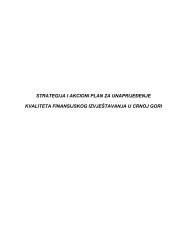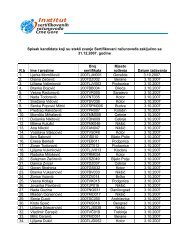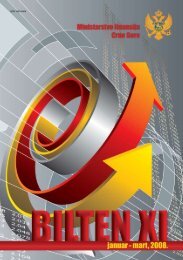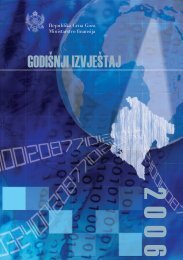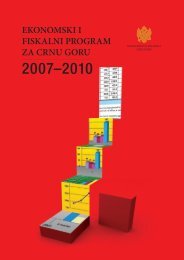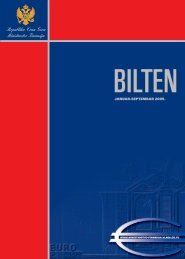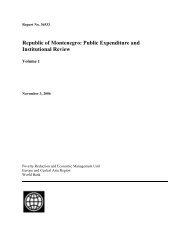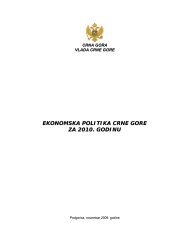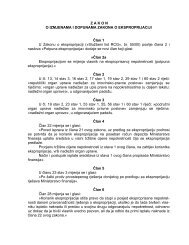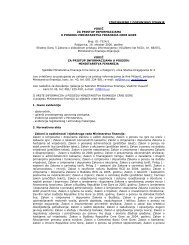director - Ministarstvo finansija
director - Ministarstvo finansija
director - Ministarstvo finansija
Create successful ePaper yourself
Turn your PDF publications into a flip-book with our unique Google optimized e-Paper software.
State aid<br />
BULLETIN OF THE MINISTRY OF FINANCE/JANUARY-MARCH 2006<br />
During the last meeting of the EC<br />
Enhanced Permanent Dialogue with the<br />
representatives of Montenegro, the<br />
Commission positively marked progress<br />
achieved in the area of state aid, noting<br />
that the Ministry of Finance of Montenegro<br />
did a lot within a short 10 month<br />
period of time.<br />
LEGAL REGULATIONS<br />
CONCERNING THE STATE AID<br />
CONTROL IN THE EU<br />
The state aid system in the European<br />
Union is defined under the Articles 87<br />
and 88 of the Treaty Establishing the European<br />
Community (hereinafter referred<br />
to as the Treaty).<br />
Pursuant to relevant EU regulations,<br />
state aid means any aid in terms of benefit<br />
or advantage granted by a state, or<br />
from state resources through a public,<br />
state authority, which favours certain<br />
companies or products (selection principle)<br />
or distorts or may distort level playing<br />
field in market<br />
According to Article 87, paragraph 1<br />
of the Treaty, the following shall be deemed<br />
state aid:<br />
1. any aid granted through State resources;<br />
2. any aid which favours certain undertakings,<br />
sector or region<br />
3. any aid which is selective because<br />
it distorts the market competition by favouring<br />
certain undertakings, sector or<br />
region;<br />
4. any aid which affects competition<br />
and trade between Member States.<br />
Types of state aids are as follows: horizontal<br />
state aid (intended for all economic<br />
entities participating in the market),<br />
sectoral state aid (intended for<br />
economic entities within specific economic<br />
and non-economic activities) and<br />
regional state aid (intended for less<br />
developed areas).<br />
State aid may include: subventions,<br />
tax allowances or any other form of<br />
Danijela Jauković<br />
non-payment of state fees; exemptions<br />
from payment of social contributions;<br />
granting interest rates/loans/guarantees/real<br />
estate under conditions which<br />
are more favourable then market ones;<br />
approving allowances for incurred business<br />
losses; export aid or regressive export<br />
crediting; establishing funds for<br />
development/housing construction;<br />
providing income and price support;<br />
providing goods or services which are<br />
not part of the public services; approving<br />
more favourable treatment in the<br />
public procurement, etc.<br />
Certain categories of the horizontal,<br />
sectoral and regional state aid may be<br />
allowed under conditions set forth under<br />
the EU by-laws.<br />
According to regulations and methodology<br />
of the EU, the following shall not<br />
be considered state aid: aid for beneficiaries<br />
which are not economic entities<br />
(households, handicapped persons, aid<br />
for infrastructure, educational institutions,<br />
hospitals, public housing, vocational<br />
training centers); general economic<br />
policy measures (quotas, public procurement,<br />
technical standards, general VAT<br />
reduction); aid granted by national and<br />
multinational organizations, EU funds,<br />
government functions (defense, public<br />
works).<br />
Article 88 of the Treaty defines procedure<br />
related to applying for and control<br />
of state aid, which is under the<br />
competence of a separate European<br />
Commission established to this end. The<br />
European Commission, together with<br />
Member States, constantly monitors all<br />
systems of aid existing within Member<br />
States and requires appropriate measures<br />
required for gradual development<br />
and action. Such authorization enables<br />
the Commission to indicate a change in<br />
state of affairs (by monitoring progressive<br />
development or functioning of<br />
common market) and accordingly<br />
launch examination of the existing state<br />
aid.<br />
If the European Commission finds<br />
that an aid granted by a Member State<br />
or through State resources is not in<br />
compliance with acquis communitarie<br />
or with common market or such aid is<br />
being misused, it shall decide that the<br />
State concerned shall abolish or alter<br />
such aid within a period of time to be<br />
determined by the Commission. If the<br />
State concerned does not comply with<br />
this decision within the prescribed time,<br />
the Commission may refer the matter to<br />
the Court of Justice<br />
On application by a Member State,<br />
the EU Council (hereinafter referred to<br />
as the Council) may decide that aid<br />
which that State is granting or intends<br />
to grant shall be considered to be compatible<br />
with the common market, if<br />
such a decision is justified by exceptional<br />
circumstances If, however, the Council<br />
has not made its attitude known within<br />
three months of the said application<br />
being made, the European Commission<br />
shall give its decision on the case.<br />
Regulations governing state aid by<br />
the WTO and those in the European<br />
Union are compatible particularly with<br />
respect to definitions and practical purposes.<br />
ADVISOR TO THE MINISTER<br />
On co-operation with the EU<br />
and international<br />
financial institutions<br />
DANIJELA JAUKOVIĆ,<br />
30



